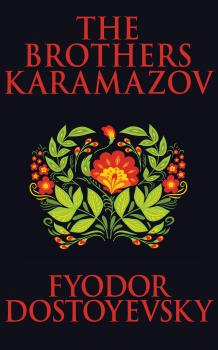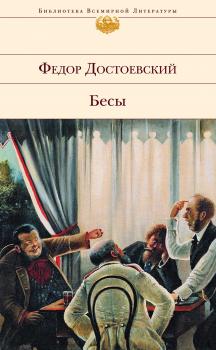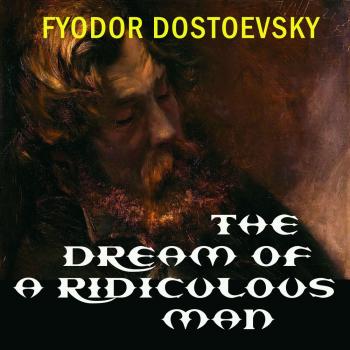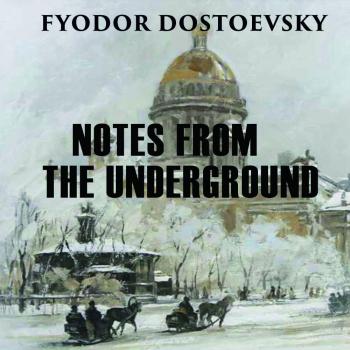ТОП просматриваемых книг сайта:
Федор Достоевский
Список книг автора Федор ДостоевскийАннотация
His final and greatest work, Dostoyevsky spent nearly two years writing The Brothers Karamazov, which was published serially in The Russian Messenger from January 1879 to November 1880. Set against a modernizing 19th-century Russia, the characters experience moral struggles of faith, judgment, and reason amid a patricidal murder which forms the center of the plot. The novel is full of ethical debates of God, free will, and morality. Dostoyevsky composed much of the novel in Staraya Russa, a spa town celebrated for its mineral springs and which inspired the main setting. Since its publication, it has been acclaimed as one of the supreme achievements in world literature.
Аннотация
This book contains several tables of HTML content to make reading easier.
Through the story of the brilliant but conflicted young Raskolnikov and the murder he commits, Fyodor Dostoyevsky explores the theme of redemption through suffering. «Crime and Punishment» put Dostoyevsky at the forefront of Russian writers when it appeared in 1866 and is now one of the most famous and influential novels in world literature. The poverty-stricken Raskolnikov, a talented student, devises a theory about extraordinary men being above the law, since in their brilliance they think «new thoughts» and so contribute to society. He then sets out to prove his theory by murdering a vile, cynical old pawnbroker and her sister. The act brings Raskolnikov into contact with his own buried conscience and with two characters – the deeply religious Sonia, who has endured great suffering, and Porfiry, the intelligent and discerning official who is charged with investigating the murder – both of whom compel Raskolnikov to feel the split in his nature. Dostoyevsky provides readers with a suspenseful, penetrating psychological analysis that goes beyond the crime – which in the course of the novel demands drastic punishment – to reveal something about the human condition: The more we intellectualize, the more imprisoned we become.
"Dostoyevsky gives me more than any scientist, more than Gauss." —Albert Einstein "Dostoyevsky wrote of the unconscious as if it were conscious; that is in reality the reason why his characters seem 'pathological', while they are only visualized more clearly than any other figures in imaginative literature… He was in the rank in which we set Dante, Shakespeare and Goethe." —Edwin Muir "The greatest crime novel of all time." —Thomas Mann "'Crime and Punishment' remains the best of all murder stories, a century and a third after its publication. We have to read it – though it is harrowing – because, like Shakespeare, it alters our consciousness." —Harold Bloom
Through the story of the brilliant but conflicted young Raskolnikov and the murder he commits, Fyodor Dostoyevsky explores the theme of redemption through suffering. «Crime and Punishment» put Dostoyevsky at the forefront of Russian writers when it appeared in 1866 and is now one of the most famous and influential novels in world literature. The poverty-stricken Raskolnikov, a talented student, devises a theory about extraordinary men being above the law, since in their brilliance they think «new thoughts» and so contribute to society. He then sets out to prove his theory by murdering a vile, cynical old pawnbroker and her sister. The act brings Raskolnikov into contact with his own buried conscience and with two characters – the deeply religious Sonia, who has endured great suffering, and Porfiry, the intelligent and discerning official who is charged with investigating the murder – both of whom compel Raskolnikov to feel the split in his nature. Dostoyevsky provides readers with a suspenseful, penetrating psychological analysis that goes beyond the crime – which in the course of the novel demands drastic punishment – to reveal something about the human condition: The more we intellectualize, the more imprisoned we become.
"Dostoyevsky gives me more than any scientist, more than Gauss." —Albert Einstein "Dostoyevsky wrote of the unconscious as if it were conscious; that is in reality the reason why his characters seem 'pathological', while they are only visualized more clearly than any other figures in imaginative literature… He was in the rank in which we set Dante, Shakespeare and Goethe." —Edwin Muir "The greatest crime novel of all time." —Thomas Mann "'Crime and Punishment' remains the best of all murder stories, a century and a third after its publication. We have to read it – though it is harrowing – because, like Shakespeare, it alters our consciousness." —Harold Bloom
Аннотация
Contiene tabla de contenido activa (HTML)
Fiódor Dostoyevski es uno de los principales escritores de su época en la Rusia Zarista; la literatura de Dostoyevski explora la psicología humana en el complejo contexto político, social y espiritual de la sociedad rusa del siglo XIX. Walter Kaufmann citó las Memorias del subsuelo (1864), escritas con la amarga voz del anónimo «hombre subterráneo», como «la mejor obertura para el existencialismo jamás escrita». En el mismo sentido, el prestigioso intelectual y escritor austriaco Stefan Zweig consideró al escritor ruso como «el mejor conocedor del alma humana de todos los tiempos». Su obra, aunque escrita en el siglo XIX, refleja al hombre y la sociedad de hoy. Sigmund Freud dijo en su obra Dostoievski y el parricidio que el capítulo de «El gran inquisidor», de la novela Los hermanos Karamazov, era una de las cumbres de la literatura universal. Cabe resaltar, asimismo, la influencia ejercida sobre Nietzsche, quien afirmó: Dostoyevski, el único psicólogo, por cierto, del cual se podía aprender algo, es uno de los accidentes más felices de mi vida, más incluso que el descubrimiento de Stendhal.
Fiódor Dostoyevski es uno de los principales escritores de su época en la Rusia Zarista; la literatura de Dostoyevski explora la psicología humana en el complejo contexto político, social y espiritual de la sociedad rusa del siglo XIX. Walter Kaufmann citó las Memorias del subsuelo (1864), escritas con la amarga voz del anónimo «hombre subterráneo», como «la mejor obertura para el existencialismo jamás escrita». En el mismo sentido, el prestigioso intelectual y escritor austriaco Stefan Zweig consideró al escritor ruso como «el mejor conocedor del alma humana de todos los tiempos». Su obra, aunque escrita en el siglo XIX, refleja al hombre y la sociedad de hoy. Sigmund Freud dijo en su obra Dostoievski y el parricidio que el capítulo de «El gran inquisidor», de la novela Los hermanos Karamazov, era una de las cumbres de la literatura universal. Cabe resaltar, asimismo, la influencia ejercida sobre Nietzsche, quien afirmó: Dostoyevski, el único psicólogo, por cierto, del cual se podía aprender algo, es uno de los accidentes más felices de mi vida, más incluso que el descubrimiento de Stendhal.
Аннотация
Contiene tabla de contenido activa (HTML)
Fiódor Dostoyevski es uno de los principales escritores de su época en la Rusia Zarista; la literatura de Dostoyevski explora la psicología humana en el complejo contexto político, social y espiritual de la sociedad rusa del siglo XIX. Walter Kaufmann citó las Memorias del subsuelo (1864), escritas con la amarga voz del anónimo «hombre subterráneo», como «la mejor obertura para el existencialismo jamás escrita». En el mismo sentido, el prestigioso intelectual y escritor austriaco Stefan Zweig consideró al escritor ruso como «el mejor conocedor del alma humana de todos los tiempos». Su obra, aunque escrita en el siglo XIX, refleja al hombre y la sociedad de hoy. Sigmund Freud dijo en su obra Dostoievski y el parricidio que el capítulo de «El gran inquisidor», de la novela Los hermanos Karamazov, era una de las cumbres de la literatura universal. Cabe resaltar, asimismo, la influencia ejercida sobre Nietzsche, quien afirmó: Dostoyevski, el único psicólogo, por cierto, del cual se podía aprender algo, es uno de los accidentes más felices de mi vida, más incluso que el descubrimiento de Stendhal.
Fiódor Dostoyevski es uno de los principales escritores de su época en la Rusia Zarista; la literatura de Dostoyevski explora la psicología humana en el complejo contexto político, social y espiritual de la sociedad rusa del siglo XIX. Walter Kaufmann citó las Memorias del subsuelo (1864), escritas con la amarga voz del anónimo «hombre subterráneo», como «la mejor obertura para el existencialismo jamás escrita». En el mismo sentido, el prestigioso intelectual y escritor austriaco Stefan Zweig consideró al escritor ruso como «el mejor conocedor del alma humana de todos los tiempos». Su obra, aunque escrita en el siglo XIX, refleja al hombre y la sociedad de hoy. Sigmund Freud dijo en su obra Dostoievski y el parricidio que el capítulo de «El gran inquisidor», de la novela Los hermanos Karamazov, era una de las cumbres de la literatura universal. Cabe resaltar, asimismo, la influencia ejercida sobre Nietzsche, quien afirmó: Dostoyevski, el único psicólogo, por cierto, del cual se podía aprender algo, es uno de los accidentes más felices de mi vida, más incluso que el descubrimiento de Stendhal.
Аннотация
В «Идиоте» творческие принципы Достоевского воплотились в полной мере, а удивительное владение сюжетом достигло подлинного расцвета. В сюжетную основу романа легли глубокая и почти болезненная история несчастного князя Мышкина, неистового Парфена Рогожина и отчаявшейся Настасьи Филипповны Этот роман – один из любимых текстов самого Достоевского и одно из самых цитируемых и экранизируемых произведений мировой классики. Читает: Алексей Багдасаров Иллюстрация: Юлия Стоцкая Запись произведена студией звукозаписи ВИМБО ©&℗ Аудио Издательство ВИМБО, 2020 Продюсеры: Вадим Бух, Михаил Литваков
Аннотация
«Бесы» (1872) – безусловно, роман-предостережение и роман-пророчество, в котором великий писатель и мыслитель указывает на грядущие социальные катастрофы. История подтвердила правоту писателя, и неоднократно. Кровавая русская революция, деспотические режимы Гитлера и Сталина – страшные и точные подтверждения идеи о том, что ждет общество, в котором партийная мораль замещает человеческую.
Но, взяв эпиграфом к роману евангельский текст, Достоевский предлагает и метафизическую трактовку описываемых событий. Не только и не столько о «неправильном» общественном устройстве идет речь в романе – душе человека грозит разложение и гибель, души в первую очередь должны исцелиться. Ибо любые теории о переустройстве мира могут привести к духовной слепоте и безумию, если утрачивается способность различения добра и зла.
Аннотация
"The Dream of a Ridiculous Man" (Russian: Сон смешного человека, Son smeshnovo cheloveka) is a short story by Fyodor Dostoyevsky written in 1877. It chronicles the experiences of a man who decides that there is nothing of any value in the world. Slipping into nihilism with the “terrible anguish” he is determined to commit suicide. A chance encounter with a young girl, however, begins the man on a journey that re-instills a love for his fellow man. It was first published in A Writer's Diary. The story opens with the narrator wandering the streets of St. Petersburg. He contemplates how he has always been a ridiculous person, and also, how recently, he has come to the realization that nothing much matters to him any more. It is this revelation that leads him to the idea of suicide. The narrator of the story reveals that he had bought a revolver months previous with the intent of shooting himself in the head. Despite a dismal night, the narrator looks up to the sky and views a solitary star. Shortly after seeing the star, a little girl comes running towards him. The narrator surmises that something is wrong with the girl's mother. He shakes the girl away and continues on to his apartment… Among the most significant works Fyodor Dostoyevsky - Poor Folk, The Double, The Landlady, Netochka Nezvanova, Uncle's Dream, The Village of Stepanchikovo, Humiliated and Insulted, The House of the Dead, Notes from Underground, Crime and Punishment, The Gambler, The Idiot, The Eternal Husband, Demons, The Adolescent, The Brothers Karamazov
Аннотация
The Christmas Tree and the Wedding" is a short story written by Russian author Fyodor Dostoyevsky published in 1848. The piece is narrated by an awkward outcast attending a Christmas party. He observes the party's guest of honour and takes special interest in one of the children. The narrator begins by mentioning to the reader that he had just been to a wedding but recalls a Christmas party that he had found more interesting. The party was given with the pretext of being a children's party, but its real purpose was for the wealthy host's family to talk business with rich members of the community. The wealthiest guest was Julian Mastakovich, a rotund landowner. Without anyone to talk to, the narrator fell to simply observing the guests. The narrator takes particular interest in the children. They were given gifts in accordance with their social standing. The eleven-year-old daughter of a wealthy government contractor received an expensive doll, while the poorest child, the son of the family governess, received only a small book without illustrations or even a front and back cover. After being bullied by the other richer boys, the poor boy retreats to another room where he and the rich daughter play happily with the doll. Julian Matsakovich also retreats from the rest of the crowd to observe the rich daughter, who already had a dowry set aside of 300,000 rubles. As Mastakovich observes the girl, he calculates what her dowry (with interest) would be at age sixteen, and he comes up with the astounding sum of 500,000 rubles. Mastakovich approaches the girl and kisses her on the head. The girl recoils from his gesture, and she looks to her playmate for protection. Mastakovich tries to scare the poor boy away while trying to get a promise of love from the young girl, and eventually he causes a scene where he chases the poor boy around the party, whipping at him with his handkerchief. The wedding that the narrator came across five years later was indeed the wedding between Julian Mastakovich and the rich girl, now sixteen. Famous works of the author Fyodor Dostoyevsky: Poor Folk, The Double, The Landlady, Netochka Nezvanova, Uncle's Dream, The Village of Stepanchikovo, Humiliated and Insulted, The House of the Dead, Notes from Underground, Crime and Punishment, The Gambler, The Idiot, The Eternal Husband, Demons, The Adolescent, The Brothers Karamazov.
Аннотация
Notes from Underground also translated as Notes from the Underground or Letters from the Underworld, is an 1864 novella by Fyodor Dostoevsky. Notes is considered by many to be one of the first existentialist novels. It presents itself as an excerpt from the rambling memoirs of a bitter, isolated, unnamed narrator (generally referred to by critics as the Underground Man), who is a retired civil servant living in St. Petersburg. The first part of the story is told in monologue form, or the underground man's diary, and attacks emerging Western philosophy, especially Nikolay Chernyshevsky's What Is to Be Done? The second part of the book is called «Apropos of the Wet Snow» and describes certain events that appear to be destroying and sometimes renewing the underground man, who acts as a first person, unreliable narrator and anti-hero. Fyodor Dostoevsky is also famous for such works as: Poor Folk, The Double, The Landlady, Netochka Nezvanova, Uncle's Dream, The Village of Stepanchikovo, Humiliated and Insulted, The House of the Dead, Notes from Underground, Crime and Punishment, The Gambler, The Idiot, The Eternal Husband, Demons, The Adolescent, The Brothers Karamazov.
Аннотация
Федор Михайлович Достоевский (1821–1881) – великий русский писатель, один из высших выразителей духовно-нравственных ценностей русской культуры; член-корреспондент Петербургской Академии наук (1877). Творчество Достоевского, как великого писателя и психолога, изучает и изображает потаенные уголки человеческих душ. Пытается приоткрыть замыслы и мотивы поведения человека в необычных и часто непристойных ситуациях. Низость, благородство, подлость и честь всегда ходят бок о бок и их противостояние определяет нашу жизнь. В книгу включены произведения Ф.М.Достоевского, написанные им в 1850-1860-е годы – «Скверный анекдот» создан на основе семипалатинского периода жизни писателя.










